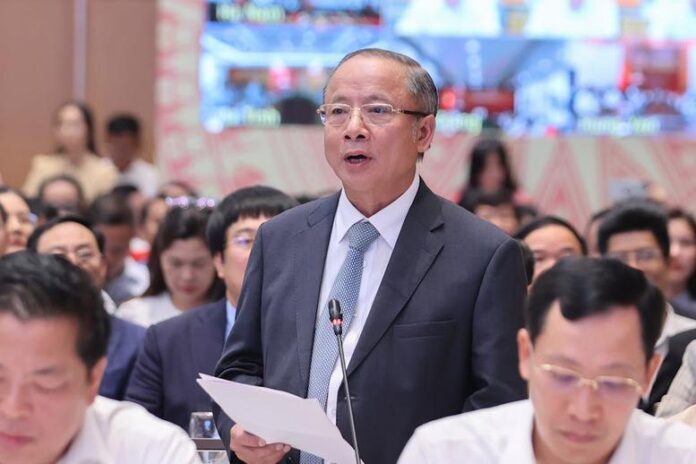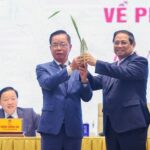Speaking at a discussion panel with businesses and business associations to effectively implement Resolution 68-NQ/TW of the Politburo on private economic development, Mr. Nguyen Van Than, Chairman of the Vietnam Association of Small and Medium-sized Enterprises (VINASME), affirmed that Resolution 68 of the Politburo has shown breakthroughs in concepts and thinking about private economic development, setting out specific goals, tasks, and drastic solutions.
Especially, the fact that the Government and the National Assembly quickly issued Resolution 138 and Resolution 198 just 12 days after the adoption of Resolution 68 is an unprecedented move, demonstrating strong determination and synchronization.
“The current focus is to institutionalize the resolutions into specific mechanisms and policies with high feasibility in practice,” Mr. Than emphasized, and affirmed that VINASME commits to cooperating, coordinating, and supporting government agencies in implementing the action programs, focusing on groups of small, medium, and super small enterprises, and especially promoting the transformation of business households into enterprise models.
PROPOSAL FOR A PRACTICAL SUPPORT PACKAGE FOR TRANSITIONING BUSINESS HOUSEHOLDS
To concretize the resolutions, Mr. Nguyen Van Than proposed that the Government urgently build and concretize mechanisms and policies suitable for each group of business objects according to their scale. At the same time, assign specific tasks to VINASME, orienting the Association’s role in coordinating with state agencies to promote the development of the small and medium-sized enterprise community, especially the transformation of business households.
The Association also proposed speeding up the removal of administrative procedure barriers and changing the management mindset from prohibition to development creation. The program for reducing and simplifying administrative procedures for the period of 2025-2026 needs to set specific goals, ensuring no dependence on administrative boundaries. We propose establishing an independent research and reporting unit, including representatives from state agencies and business associations, to evaluate the effectiveness,” said Mr. Than.
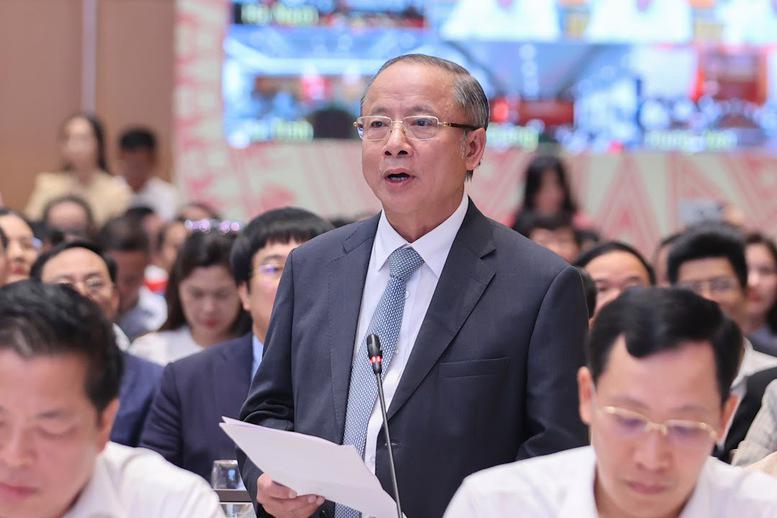
In addition, it is necessary to focus on supporting small and medium-sized enterprises to access key resources such as land, finance, science and technology, and high-quality human resources. For tens of thousands of production facilities and business households facing difficulties due to Directive 07/CT-TTg (related to production facilities licensed before the formation of industrial zones), Mr. Than suggested that the Government consider abolishing or adjusting it, and it is possible to extend the transition period for 1-2 years so that business households have enough time to transform without interrupting production.
Especially, with a passion for supporting more than 5 million business households to transform into enterprise models, VINASME proposed strong incentive policies such as exempting corporate income tax for the first 3 years after transformation, and supporting business establishment costs…
“We also propose that the State provides a free accounting application (app) for business households to self-declare and pay taxes, reducing the burden on tax authorities and creating a habit of professional financial management. Free training programs on enterprise management, accounting, and digital transformation are also recommended,” shared Mr. Than.
The Association also proposed that the Government assign direct tasks to VINASME in a written document in propagating, supporting, and protecting the rights and interests of business households; assigning the Association to be the focal point for deploying training programs for business households, small and super small enterprises; allowing the Association to participate in supervising and critiquing policies; and promoting the establishment of a digital bank dedicated to small, medium, and business households to address capital difficulties.
UNBLOCKING LEGAL OBSTACLES
At the seminar, the leaders of large enterprises also contributed many enthusiastic opinions to unblock legal obstacles for enterprises.
Ms. Mai Kieu Lien, Director of Vinamilk, expressed her optimism: “If we can do as the Prime Minister and the Deputy Prime Ministers have said, it won’t take until 2025-2030 to complete, but it can be as fast as the Ho Chi Minh City Campaign, just a few months,” Ms. Lien emphasized.
Ms. Lien suggested that in the process of implementation, if there are any problems or obstacles, she hoped that the ministries, branches, and the Government would quickly handle and resolve them. A certain time frame can be specified, for example, 7 days or 15 days, to resolve the difficulties of enterprises.
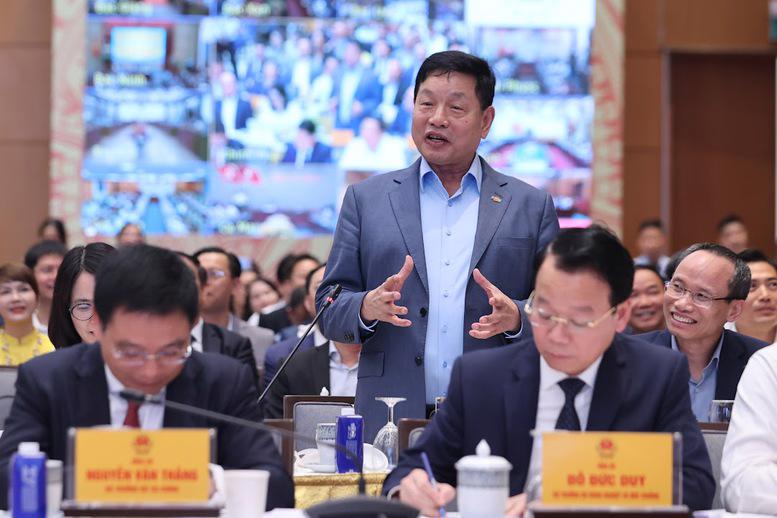
Sharing the same view on the importance of implementation, Mr. Nguyen Quoc Hiep, Chairman of the Vietnam Contractors Association, said that Resolution 68 of the Politburo is the “golden key” but needs specific actions.
Accordingly, he proposed that there should be a coordinating agency for inspection and supervision so that enterprises are only inspected once a year, avoiding overlaps. In terms of institutions, Mr. Hiep pointed out the inadequacies in some decrees guiding new laws, for example, Decree 103 on the collection of land use levies, and suggested that legal documents should be contributed by the subjects before issuance.
To realize the view that “enterprises are the serving object instead of the managed object”, Mr. Hiep proposed that ministries and branches need to change the management company and that localities should meet with enterprises periodically every 6 months.
For the construction industry, Mr. Hiep suggested changing the system of detailed unit prices to composite unit prices and adjusting salary prices to suit the reality. For key national projects, he proposed specific mechanisms such as ordering or conditional designation, while promoting public-private cooperation in training human resources for the construction industry.
Mr. Truong Gia Binh, Head of the Private Economic Development Research Group, likened Resolution 68 to “sunshine after drought”, bringing great hope to the business community. He called for a “new Dien Bien Phu” spirit in economic development, with “battles” such as the North-South high-speed railway and the world financial center, and pledged that enterprises would wholeheartedly dedicate themselves.
In the field of high-tech agriculture, Mr. Tran Manh Bao, Chairman of the Vietnam Plant Variety Traders Association, pointed out difficulties in land, credit, and tax policies for research and development. He proposed that the State soon build a separate mechanism for agricultural science and technology enterprises, amend the Law on Cultivation for uniformity, create a fund to support innovation and an effective public-private partnership mechanism.
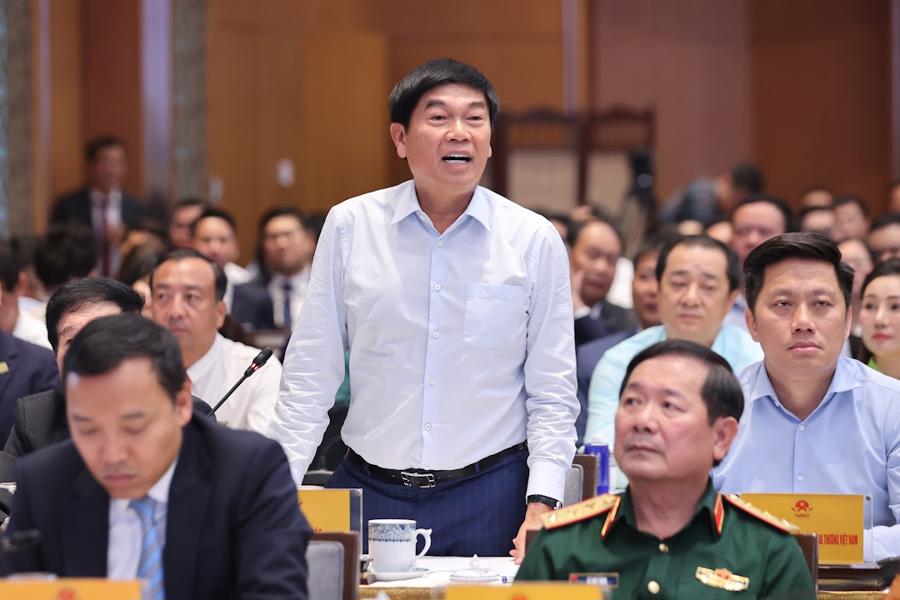
Mr. Tran Dinh Long, Chairman of Hoa Phat Group, stated that Resolution 68 is “fantastic” compared to the wishes and proposals of large enterprises six months ago. The issue is that after Resolution 68, Resolution 198 of the National Assembly, the decrees, and circulars of the Government also need to be clearer and more specific.
“For example, for the high-speed railway project, if we want to do it quickly, we can call for foreign tenders. But if we want to protect our domestic railway industry, we must protect domestic production. We propose that all resolutions of the Government must have a clear ratio and be included in a specific document. I dare to propose that for all public investment projects, for example, high-speed roads, the ratio must be 70% of domestically produced goods. That’s a firm condition. The documents need to be clearer, avoiding cases where the draft decree on ordering has vague wording that can be interpreted in any way. For example, the decree on ordering says “prioritize the use of domestic goods”, in my opinion, it should clearly state that domestic goods that can be produced must be used, not just prioritized,” Mr. Long proposed.
“Leading Vietnamese Conglomerates: Capable of Constructing the Nation’s Infrastructure”
“The following is an insightful share from the Chairman of the Board of Directors of CMC Technology Group Joint Stock Company at a seminar chaired by the Prime Minister with enterprises and business associations to effectively implement Resolution 68.”
When Vietnam Entered the Top 25 Largest Economies in the World
“Mr. Michael Kokalari, Head of Macroeconomic and Market Research at VinaCapital, asserts that the core vision of Resolution 68 on private economic development is to foster a rapidly growing, sustainable, high-quality, and globally competitive private sector. The UK-based independent economic forecasting center estimates that Vietnam will join the ranks of the world’s 25 largest economies by 2039.”
“Small Businesses, Get Ready: It’s Time to Integrate Your Cash Registers with e-Invoices, Effective Today, June 1st.”
As of June 1st, business households with an annual revenue of 1 billion VND and above are mandated to adopt electronic invoices generated from cash registers. Failure to comply with this regulation will result in monetary penalties.

